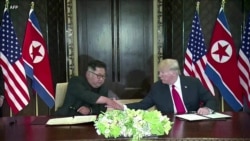What the return of Donald Trump’s “America First” foreign policy means for Asian countries.
Welcome to VOA Asia Weekly. I'm Chris Casquejo in Washington. That story is just ahead...
...but first, making headlines:
After Donald Trump won the U.S. presidential election, Japan's prime minister, Shigeru Ishiba, said he wants to take his country's alliance with the U.S. "to new heights.” China said it hopes for "peaceful coexistence" with the United States.
Russian lawmakers on Wednesday voted unanimously to ratify a landmark mutual defense pact with North Korea. Kyiv and the West say Pyongyang sent thousands of troops to fight for Russia against Ukraine.
Philippine forces practiced retaking an island in the South China Sea Wednesday in the first such combat exercise in disputed waters. The Philippine military chief said Chinese navy ships kept watch from a distance.
Indonesia’s National Disaster Management Agency said Monday that fires and debris from a series of volcanic eruptions on the remote island of Flores have killed at least 10 people.
I want to thank the American people for the extraordinary honor of being elected your 47th president and your 45th one.
U.S. allies in Asia are congratulating Donald Trump on his decisive victory in Tuesday’s U.S. presidential election, but many in Asia also worry about what the return of his “America First” foreign policy means for their countries, as VOA’s Bill Gallo reports from Seoul.
In his first term as president, Donald Trump mixed high-profile threats with diplomacy as he pursued an unpredictable foreign policy.
With Trump now returning to office, U.S. allies and partners in Asia are trying to figure out what “America First” Round 2 means for them.
In South Korea, President Yoon Suk Yeol was optimistic on Thursday, saying he and Trump will build a “perfect security posture.”
((Yoon Suk Yeol, South Korean President (In Korean, male voice) ))
“We talked about having strong solidarity and partnership in the Asia-Pacific and global region based on the South Korea-U.S. alliance.”
Many in Seoul are concerned Trump could strike a deal with North Korea, possibly without consulting the South.
Trump has also continued to push South Korea to pay much more to host U.S. troops, leading many in Seoul to question just how committed Washington is to its defense.
Japan has similar worries, although Prime Minister Shigeru Ishiba called his first talks with Trump “very friendly.”
Ishiba’s ruling party last month suffered a major election defeat. If he survives as prime minister, some fear a weakened Ishiba could have trouble pushing back on Trump's demands.
“To deal successfully with Mr. Trump, you need to be strong. You need to be well endowed with your political capital. And that's the thing that the Japanese leader – Ishiba, whoever – cannot show and cannot have.”
In Taiwan, the government insisted its ties with the U.S. remain “rock solid.”
But it also warned China may try to test the new U.S. president through continued military intimidation of the island.
Trump has sent mixed messages on Taiwan, complaining it steals U.S. manufacturing jobs and should pay if it wants U.S. protection.
There are also widespread concerns about more Trump tariffs, and how an expanded U.S.-China trade war would affect the region.
“Here in Asia many expect a transition away from the more values-based diplomacy of President Joe Biden toward something more transactional under Trump. But what exactly that looks like, is not clear. Bill Gallo. VOA News. Seoul, South Korea.
Visit voanews.com for the most up-to-date stories.
I’m Chris Casquejo.
Finally, forget the polls and follow Moo Deng.
On Monday before the U.S. election, Thailand’s famous baby pygmy hippo was offered two fruit baskets, each labeled with the names of the presidential candidates – Donald Trump and Kamala Harris. The baskets were dragon fruit and watermelons.
Moo Deng chose the one bearing Trump’s name.
Thanks for watching VOA Asia Weekly.











